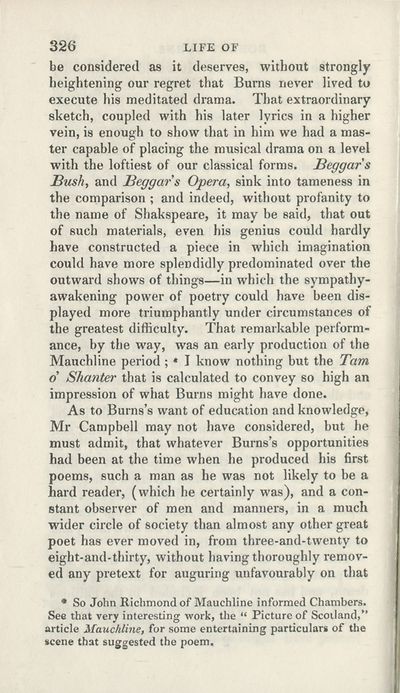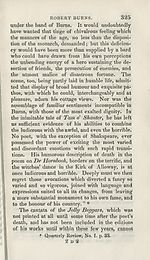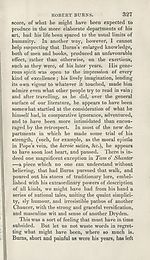Scotland/Scots > Life of Robert Burns
(336)
Download files
Complete book:
Individual page:
Thumbnail gallery: Grid view | List view

LIFE OF
326
be considered as it deserves, without strongly
heightening our regret that Burns never lived to
execute his meditated drama. That extraordinary
sketch, coupled with his later lyrics in a higher
vein, is enough to show that in him we had a mas¬
ter capable of placing the musical drama on a level
with the loftiest of our classical forms. Beggar s
Bushy and Beggar s Opera, sink into tameness in
the comparison ; and indeed, without profanity to
the name of Shakspeare, it may be said, that out
of such materials, even his genius could hardly
have constructed a piece in which imagination
could have more splendidly predominated over the
outward shows of things—in which the sympathy¬
awakening power of poetry could have been dis¬
played more triumphantly under circumstances of
the greatest difficulty. That remarkable perform¬
ance, by the way, was an early production of the
Mauchline period ; * I know nothing but the Tam
o Shanter that is calculated to convey so high an
impression of what Burns might have done.
As to Burns’s want of education and knowledge,
Mr Campbell may not have considered, but he
must admit, that whatever Burns’s opportunities
had been at the time when he produced his first
poems, such a man as he was not likely to be a
hard reader, (which he certainly was), and a con¬
stant observer of men and manners, in a much
wider circle of society than almost any other great
poet has ever moved in, from three-and-twenty to
eight-and-thirty, without having thoroughly remov¬
ed any pretext for auguring unfavourably on that
* So John Richmond of Mauchline informed Chambers.
See that very interesting work, the “ Picture of Scotland,”
article Mauchline, for some entertaining particulars of the
scene that suggested the poem.
326
be considered as it deserves, without strongly
heightening our regret that Burns never lived to
execute his meditated drama. That extraordinary
sketch, coupled with his later lyrics in a higher
vein, is enough to show that in him we had a mas¬
ter capable of placing the musical drama on a level
with the loftiest of our classical forms. Beggar s
Bushy and Beggar s Opera, sink into tameness in
the comparison ; and indeed, without profanity to
the name of Shakspeare, it may be said, that out
of such materials, even his genius could hardly
have constructed a piece in which imagination
could have more splendidly predominated over the
outward shows of things—in which the sympathy¬
awakening power of poetry could have been dis¬
played more triumphantly under circumstances of
the greatest difficulty. That remarkable perform¬
ance, by the way, was an early production of the
Mauchline period ; * I know nothing but the Tam
o Shanter that is calculated to convey so high an
impression of what Burns might have done.
As to Burns’s want of education and knowledge,
Mr Campbell may not have considered, but he
must admit, that whatever Burns’s opportunities
had been at the time when he produced his first
poems, such a man as he was not likely to be a
hard reader, (which he certainly was), and a con¬
stant observer of men and manners, in a much
wider circle of society than almost any other great
poet has ever moved in, from three-and-twenty to
eight-and-thirty, without having thoroughly remov¬
ed any pretext for auguring unfavourably on that
* So John Richmond of Mauchline informed Chambers.
See that very interesting work, the “ Picture of Scotland,”
article Mauchline, for some entertaining particulars of the
scene that suggested the poem.
Set display mode to:
![]() Universal Viewer |
Universal Viewer | ![]() Mirador |
Large image | Transcription
Mirador |
Large image | Transcription
| Antiquarian books of Scotland > Scotland/Scots > Life of Robert Burns > (336) |
|---|
| Permanent URL | https://digital.nls.uk/108249891 |
|---|
| Description | Thousands of printed books from the Antiquarian Books of Scotland collection which dates from 1641 to the 1980s. The collection consists of 14,800 books which were published in Scotland or have a Scottish connection, e.g. through the author, printer or owner. Subjects covered include sport, education, diseases, adventure, occupations, Jacobites, politics and religion. Among the 29 languages represented are English, Gaelic, Italian, French, Russian and Swedish. |
|---|

